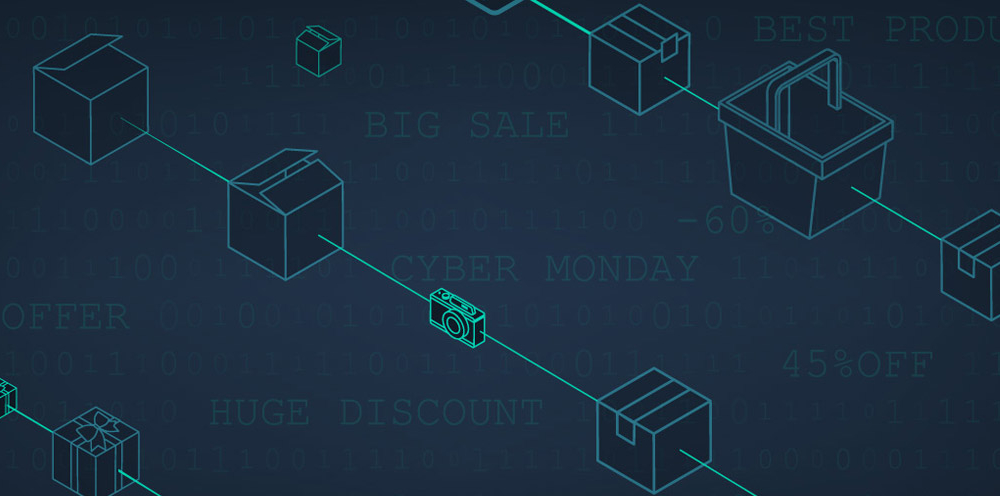Cyber Monday: What’s the Future of Online Shopping?
Dec 2, 2019

As Cyber Monday kicks in, let’s stop for a while and think – how will online shopping look in the future? Will we shop as we do it now? Will we switch to voice assistants completely? Will blockchain transform e-commerce?
Why Cyber Monday?
How did we end up ordering everything from the Internet? You could trace the early beginnings back to the early 1970s. Funny enough, the first online trade was carried on ARPANET between students of MIT and Stanford Artificial Intelligence Laboratory. Yes, they sold cannabis.
But the real growth came in the 90s, with books.com, Amazon, and eBay being founded. And now, e-commerce generates almost $30 trillion on a yearly basis.
It shouldn’t be a surprise that Black Friday, the so-called “day of consumption”, has eventually moved from brick-and-mortar shops to online retailers. To extend the period of the biggest discounts (or the biggest spending), Cyber Monday was introduced around 15 years ago.
Its purpose was to stimulate online sales, and it seems to be working – in 2018 it broke online sales records with $7.9 billion in revenue. A year before, the figure was about $1 billion lower.
Just as Black Friday is a celebration of in-store shopping, Cyber Monday is a celebration of online shopping.
The Future of E-Commerce

Online shopping is growing extremely fast. We’ve seen a lot of innovations in this industry during the last two decades, even though they may not seem that revolutionary.
First, we could only shop with credit cards in not-that-safe online environments. Then, PayPal came and revolutionized online payments. Together with the popularization of online banking, this became the fuel for e-commerce growth.
This industry has been tightly linked to payments and security. The security doesn’t always mean technical security – consumers seek innovations that would make online shopping as safe as possible in terms of guarantees, returns, cash-backs, and other aspects of the offer. This is really where PayPal shines.
We are in the spot where we can order many goods in seconds and receive the item the next day. If we don’t like it, we can always return it. In some extreme situations, we could actually live for months without ever leaving home. You can do all the necessary and unnecessary shopping at home.
So, how can we make it even more convenient or safe?
How Will Online Shopping Develop?

We’re not the first to think about the future of online shopping. There is an ongoing debate about the ways this industry could develop in the upcoming years.
E-commerce will definitely continue growing, and we will definitely see it break new records. Unless an economic slowdown occurs, and then we’ll have to delay breaking the records.
Integrations with social media will most probably move further along, eventually allowing us to buy, for example, clothes directly from some model’s photos. We are also likely looking at the development and adoption of VR, but probably at a slower pace. VR is now more like a gadget that you use for the sake of using it – it’s not integrated into our lives. Right now, Augmented Reality seems to be used more widely but it might become a driver for broader use of VR.
One of the biggest changes for the industry might be also switching to voice commands. It’s happening right now with Alexa and voice assistant devices, and as its use increases, we’ll see more customers who just say, “Hey Alexa, order me a pair of Levi’s jeans” and don’t waste time on researching prices, comparing products, and so forth.
With the eco-aware movement growing around the globe, more and more clients will want to know how the products are made and from what materials, workers’ living and working conditions, and other similar concerns. This will also challenge producers and retailers to provide this information in a way that can be trusted.
We’re not the first to think about the future of online shopping. There is an ongoing debate around the ways this industry could develop in the upcoming years.
Blockchain for E-commerce?

While blockchain and cryptocurrencies will continue to take their spot in the mainstream, they will definitely play their role in shaping the future of e-commerce.
It could start with how products are made and what we – as customers – know about them. Public blockchains can bring transparency to manufacturing and supply chains. The companies that will provide complete, honest, and immutable data about their products will attract sustainability-aware customers.
In a 2018 post on Forbes, the author highlights research performed on a representative group of 1,000 Americans. Here’s what they found out:
- 68% of millennials bought a product with social or environmental benefits in the past 12 months (data from 2017).
- 87% of consumers have a more positive image of a company that supports social or environmental issues.
- 88% will be more loyal to a company that supports social or environmental issues.
- 92% will be more likely to trust a company that supports social or environmental issues.
Blockchain can provide these customers with a tool to verify the claims of these socially and environmentally conscious companies. Companies won’t be recognized just by the beautiful words they say but also through real actions incorporated into their processes. Right now, we can only trust that what those big corporations claim is true. But in the world of blockchain, we’ll just need to see their actions in order to know they can be trusted.
Of course, this is business, so parts of that blockchain would have to be kept private, so this is a perfect use case for the Aleph Zero protocol, as it allows storing data in both public and private manners.
This type of transparency might also be required with voice assistants. The biggest threat in this technology is data privacy. Right now, there are concerns regarding whether these devices are listening to conversations before they are awakened, and the safety of the data stored in their clouds.
The hopes are high for blockchain to bring back control over our personal information. With decentralization, we can decide what entities can see and use our data, what did use them, and block access if we don’t want to share the data anymore.
How About Crypto Tuesday?
Just as e-commerce disrupted the way we shop, crypto could do that in its own form. It can transform the way we look for products, compare them, and purchase them.
Maybe after blockchain becomes globally used, we’ll see a new celebration – let’s call it Crypto Tuesday – in which we would pay for everything with the digital assets of our choice.
Well, that would require using Common, but it should be available next year, so we may just see you next year on Crypto Tuesday, powered by Aleph Zero.


